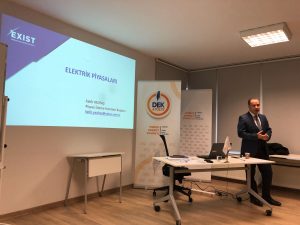 We would like to share some of the highlights from the training we offered in WEC Workshop with the with the participation of Mr. Fatih YAZITAŞ, the Market Surveillance Manager to Energy Exchange İstanbul (EPİAŞ).
We would like to share some of the highlights from the training we offered in WEC Workshop with the with the participation of Mr. Fatih YAZITAŞ, the Market Surveillance Manager to Energy Exchange İstanbul (EPİAŞ).
The establishment of EPİAŞ and the intraday market was a crucial step for the electricity market.
2017 has been a dry year. The decrease in water reserves, exacerbated by the fall in rainfall, had been one of the factors affecting prices. The average annual market clearing price (PTF) has increased compared to the previous year.
Wind plants’ sale proposals are independent from prices because they have a tough time predicting the extent of future winds and, for the canal type power plants, future availability of water.
Companies determine their own sales policy and which market they prefer to sell (day-ahead market, intraday market, balancing, bilateral agreements).
It is important to increase the volume of the bilateral agreements market. We find it difficult to see the number of hand-overs in the bilateral agreements. Improvements to be made in matters such as stamp tax are important.
In the near future, the profile block and block soft offer will come into play. Thermal power plants fall into a positive or negative imbalance due to their operating principles where they are back up and step in and where they back out depending on the market results where, on the next day, they don’t match, with the current block offer logic where they are offered the same amount for all hours. Thermal power plants will be able to make offers more easily thanks to the profile block offers which can change every hour in the process of activation and deactivation.
For switching to regional market clearing price (PTF), Turkish Electricity Transmission Corporation (TEİAŞ) will have to determine the regions. TEİAŞ is already working on this subject. Then, Energy Exchange İstanbul will continue the work within the determined regions.
Price forecasting is increasingly gaining importance.
The history of the green certificate market, which certifies that the electricity that the consumer consumed is from renewable energy, will lead to a further increase in the demand for renewable energy sources. This will become more and more important as we integrate more into Europe with ENSTO-E.
The free consumer limit for the year 2018 was set at 2000 kWh. Half of the consumers who are now eligible to become free consumers are currently using this right.
With Energy Exchange İstanbul’s free consumer system, it is possible to view your index information via e-devlet.
The non-physical electricity trade is carried out through the Stock Exchange Istanbul (BİST).
The sale of Energy Exchange İstanbul’s domestic software to different countries (Pakistan, Georgia, Albania) is on the agenda.
The software for the natural gas market will also be native.
You can find 10 developments that will affect the electricity markets in 2018 in the presentation.
